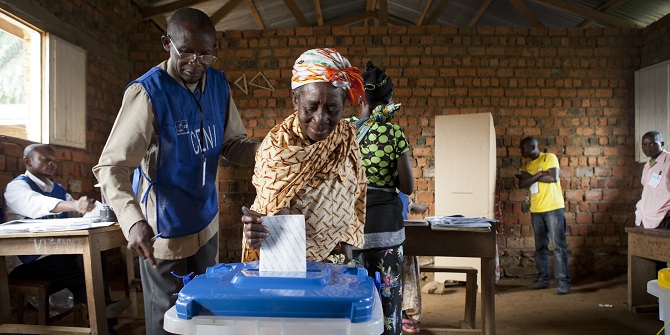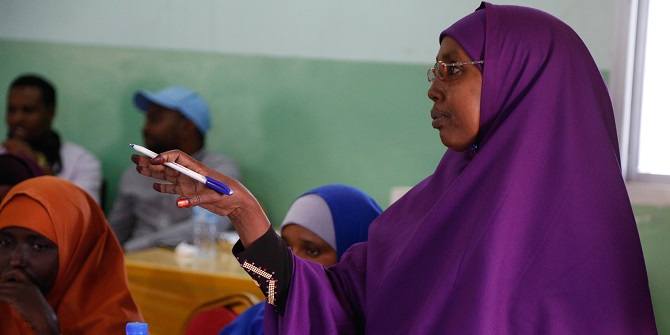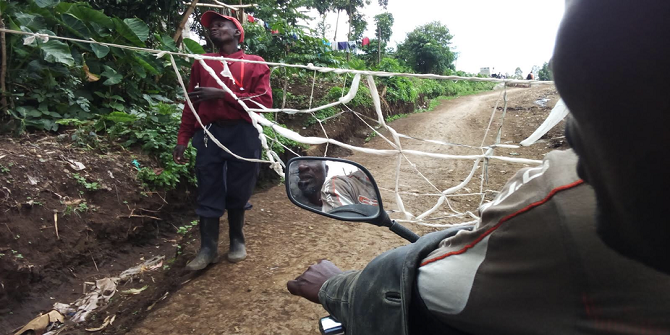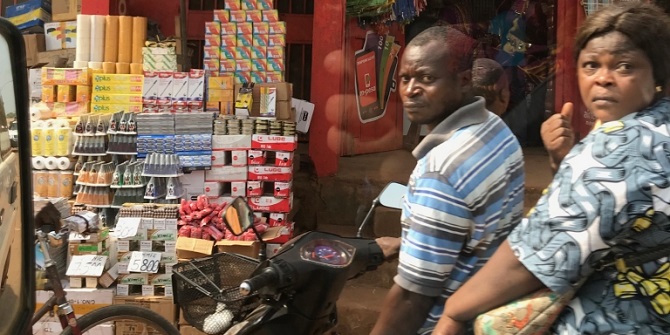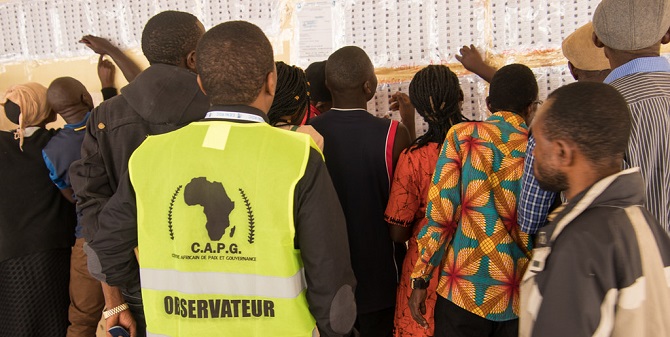
The Democratic Republic of Congo (DRC) is currently undergoing a post-electoral political transition that will have a decisive impact on its near political future. For the first time in history, we are witnessing a peaceful transition from one president to another. Despite the multiple flaws in the electoral process, the elections held in December 2018 enticed widespread hopes among the Congolese population that a true shift of power can be an outcome of such process. Half a year later however, much of this popular optimism has waned and doubts are being raised as to whether this transition will in fact lead to a substantial change in the daily lives of the Congolese. Current dynamics suggest a deepening political crisis and uncertainty and will have a major impact on existing political stability and security conditions, despite the appointment of a new government at the end of July 2019.
Two major issues undermine the new President Tshisekedi’s legitimacy. One is the credibility of the official December 2018 election results, which have been subject to heated debates. The election results have been widely read as not representing the popular vote because of numerous irregularities. In response, concerns about the legitimacy of the results were expressed by international, bilateral and multilateral partners, as well as a significant amount of the Congolese population who overwhelmingly voted for the opposition candidate Martin Fayulu. The second issue is the widespread speculation about a ‘power-sharing deal’ between former President Kabila and the new President Tshisekedi that was created in order to protect Kabila’s interests after leaving office. The July agreement on a new government between the Tshisekedi’s and Kabila’s political camps is in spirit of this deal.
Strikingly, with the exception of a number of protests following immediately after the proclamation of the results, a massive popular rejection so far has remained absent. Indeed, despite the official outcome, the elections raised a lot of hope among the millions of Congolese who were expecting that a change of regime would create the necessary conditions for an improvement of their living conditions and would, in the end, gradually lead to democracy. It explains why, despite the Kabila-Tshisekedi deal, many remained optimistic about the possibility of real change.
Most Congolese are convinced that Felix Tshisekedi is aware of his electoral illegitimacy and thus would do everything possible to gain popular support through an increased investment in good governance and development. His first 100 days in office were largely welcomed as an announcement of real change and proof of his commitment to respond to the social concerns of the population, such as the payment of salaries, the reduction of school fees, the rehabilitation of roads and public services, etc. The political legacy of his father and major opposition leader under Mobutu, Étienne Tshisekedi, further helped him to gain popular legitimacy.
Half a year after his inauguration, however, the signals are no longer positive. While President Tshisekedi spends a good deal of his time abroad attempting to consolidate his legitimacy through support from regional and international partners, at home, Congo is moving towards a deepening political crisis. The new president is faced with a constant challenge to limit Kabila’s political power and does not many options besides ‘co-leading’ the country. The agreement on a new government has proved to be subject to a sensitive power-sharing exercise and is being dominated by members of Kabila’s political camp, which has won a majority of seats in the National Assembly, Senate, Provincial Assemblies and has a majority of newly elected Provincial Governors. This leaves little room for Tshisekedi to manoeuvre. Kabila is also keeping a firm control over the economy and security services. Tshisekedi’s attempts to increase his political space are adding to existing tensions between both political families and may eventually lead to an unprecedented crisis and a point of no-return that could end in new rounds of violence.
Two recent issues illustrate current dynamics. The first is the meddling by the Constitutional Court. Thirty-three national members of parliament, including 23 opposition members have been disqualified by the Court (of which 6 out of 9 judges were nominated during Kabila’s presidency). Most of the disqualified members of parliament have been replaced by members of Kabila’s political camp, which supports the assumption that the old regime is keeping a firm grip on political rule in the DRC. The cycle of validation, invalidation and revalidation of parliamentarians by the Constitutional Court witnessed in June further adds to the growing mistrust in the court and contributes to a loss of legitimacy towards state institutions in general.
Another example is the Presidential appointment of state agents of the National Society of Railways of Congo (SNCC) and the State owned mining company, Gécamines. The Kabila camp claims that these appointments are a violation of the constitution, as they were not to be signed in the absence of a new government.
These and other issues have a major impact on existing political tensions and further contribute to a rising uncertainty and mistrust both between political elites and within the Congolese population. It also contributes to political speech inspired by identity narratives, which revive aspirations of political autonomy in Katanga, Bas-Congo, and other provinces. These aspirations express a quest to assume public authority over key resources and populations and promote development ‘from below’ but also express a wish to move away from Kinshasa, which is considered as being the cause of a lack of progress. The absence of a firm response and discourse that advocates Congolese unity is only illustrating the current state of affairs.
Many fear that in order to politically survive, President Tshisekedi will have no choice but to end the existing power sharing agreement and organise a counter-strategy limiting former President Kabila’s political control. In the event of such a cessation, the consequences risk producing the conditions for an unprecedented political crisis.Today, the fear of such a rupture is palpable. The schism growing within Kabila’s camp as a result of the disagreement between former President Kabila and Modeste Lukwebo about the latter’s decision to run for President of the Senate- opposing Alexis Thambwe Mwamba, Kabila’s preferred candidate- is only contributing to these fears.
The initial optimism of political stability held amongst the Congolese and the international community today has largely waned. Current dynamics leave us with no other option than to keep a close eye on Congo’s immediate political future. While the agreement concluded between Tshisekedi and Kabila could be read as a step towards some form of stability based on the sharing of power, in the long run, it risks further reducing Tshisekedi’s popular support and key ingredient of his power base.
Note: The CRP blogs gives the views of the author, not the position of the Conflict Research Programme, the London School of Economics and Political Science, or the UK Government.


